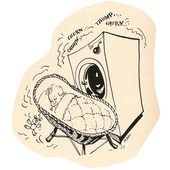Nursery World 90th anniversary: Technology - Moving forwards?
Annette Rawstrone
Monday, December 14, 2015
Annette Rawstrone, editor of Nursery World’s 75th, 80th and 85th anniversary supplements, takes a look at the rise of technology through the pages ofthe magazine

Before conventional washing machines, laundry took an entire day and involved tin tubs filled with cold water, racks for scrubbing, boiling in an iron pot, drying on a clothes line and pressing with a iron heated by the fire. On 27 October 1926, a piece about ‘The Nursery Training College’ in Wellgarth Road, Hampstead, ranked this component top of the list for training: ‘[Students] learn all about laundry work, cooking and housewifery, simple physiology and hygiene, needlework and the study of child nature.’
 Compare this with the present day when training for nursery practitioners focuses mostly on the ‘study of child nature’, otherwise known as child development, and washing a child’s clothes is the job of a machine loaded by the child’s parents. Through the archives of Nursery World, we witness the mechanisation of those once exhausting chores, undertaken predominantly by women, for centuries prior. The household technology revolution meant the arrival of not just washing machines, but vacuum cleaners, cookers, fridges and heaters. These, along with changes to society and post-war growth, did away with the need for servants to wash, cook, clean and light fires. New materials gave rise to ‘a whole new world of unbreakables’ as ‘break resistant cups, beakers and plates… save a multitude of tragedies at the stage where baby is as likely to throw his dinner across the room as to eat it’, while promising to ‘liberate mothers from many of their troubles’ (as seen in an edition from 6 May, 1965). While feeding time technology may not have changed to this day, enthusiasm for other new inventions, such as nylon clothes (which could be drip dried over the bath), now seem fortuitously out of date.
Compare this with the present day when training for nursery practitioners focuses mostly on the ‘study of child nature’, otherwise known as child development, and washing a child’s clothes is the job of a machine loaded by the child’s parents. Through the archives of Nursery World, we witness the mechanisation of those once exhausting chores, undertaken predominantly by women, for centuries prior. The household technology revolution meant the arrival of not just washing machines, but vacuum cleaners, cookers, fridges and heaters. These, along with changes to society and post-war growth, did away with the need for servants to wash, cook, clean and light fires. New materials gave rise to ‘a whole new world of unbreakables’ as ‘break resistant cups, beakers and plates… save a multitude of tragedies at the stage where baby is as likely to throw his dinner across the room as to eat it’, while promising to ‘liberate mothers from many of their troubles’ (as seen in an edition from 6 May, 1965). While feeding time technology may not have changed to this day, enthusiasm for other new inventions, such as nylon clothes (which could be drip dried over the bath), now seem fortuitously out of date.
 The birth and impact of TV has also been played out in great detail. There were fears that ‘nowadays children see and hear much more of the grown-ups’ world than they used to,’ (7 January 1960). In the 1980s, child psychologist Richard Woolfson questions whether TV is ‘banishing’ childhood with programmes like The A-Team exposing children to adult experiences too early (5 November 1987), others whether TV is becoming the ‘third parent’. A piece by Sheila Pyke notes the impact of programmes such as Starsky & Hutch and Knight Rider on the young children who are allowed to watch them: ‘Imaginative play is not only very stunted and restricted… but increasingly aggressive and violent… cartoon superheroes are copied constantly, so fantasy play seems to be all about chasing people and getting the better of them. Most include stunts that children have been known to copy, with serious results’ (23 April 1987).
The birth and impact of TV has also been played out in great detail. There were fears that ‘nowadays children see and hear much more of the grown-ups’ world than they used to,’ (7 January 1960). In the 1980s, child psychologist Richard Woolfson questions whether TV is ‘banishing’ childhood with programmes like The A-Team exposing children to adult experiences too early (5 November 1987), others whether TV is becoming the ‘third parent’. A piece by Sheila Pyke notes the impact of programmes such as Starsky & Hutch and Knight Rider on the young children who are allowed to watch them: ‘Imaginative play is not only very stunted and restricted… but increasingly aggressive and violent… cartoon superheroes are copied constantly, so fantasy play seems to be all about chasing people and getting the better of them. Most include stunts that children have been known to copy, with serious results’ (23 April 1987).
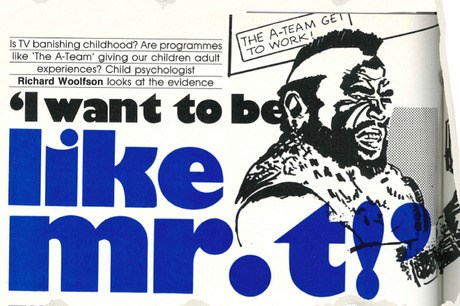
Conversely, contributors have also regularly praised television. Back in the 31 May 1951 issue, a reader writes, ‘Television has brought us such a lot of pleasure during the four months we have had it, that I really felt I must defend it.’ In 1978, a reader wrote to Nursery World’s ‘Question time’ page asking whether they were doing their young children a disservice by denying them a ‘goggle box’. The response was that being a good parent involves ‘keeping up with your children’ and keeping ‘alive to what is going on in the world today’ (11 May 1978). An increase in children’s programming by the BBC from 500 to 700 hours a year, including more during weekends and holidays, was heralded as good news for ‘frantic mums’ in 1972 (14 September 1972). And ten years later, Ms Pyke notes, ‘In the early days of television, people worried that it killed conversation in the home, but today, perhaps, it can actually give us more to talk about. It was thought, too, that it would stop people reading, although research showed that it replaced comic reading, and children who read books would continue to do so.’
As new inventions emerge through the years, it is fascinating to note the parallels in people’s reactions: newness is often seen as threatening to children’s innocence or intellect. Comics themselves were the subject of some hand-wringing, as this from 1 April 1965 illustrates: ‘We have never definitely banned comics,’ wrote Dr Philippa Craig, ‘but [we] made it clear that we liked to see the children reading worthwhile literature like Robinson Crusoe, or useful books like The History of Everyday Things.’ Old arguments that TV causes children to become more sedentary, leading to obesity, problems with speech, lack of imagination and being led astray, are all regularly deployed for children’s use of the internet, social media and computer games, while cautions that expensive toys, television and ‘show-off’ nursery equipment can’t replace time with parents are not new either (we found mentions in 16 January 1964).
The great iPads debate has also gone through several phases. A nursery manager introducing iPads in 2011 said, ‘The touchscreen technology is ideal for young children’s hands and the small size and portability make them perfect for sharing. Parents are amazed at how quickly children learn to use them’ (31 May 2011). Articles have focused on supporting early years workers and parents to make informed choices about allowing children to use screen technologies, including a report on how to establish rules and routines and choose screen activities carefully (22 November 2012). A year later came warnings about how this new technology can stop children from accessing books and a rather frightening description of a child who tried to swipe, expand and bang a magazine to try to make it play. ‘Nothing happens. And in frustration she throws it away. To a toddler a magazine is a tablet that’s broken’ (11 October 2013). Last year, an editorial stated: ‘There are huge benefits from tablets if the right balance is struck, and it is unrealistic to think that we can exclude young children from encountering them’ (13 January 2014).
And sometimes, technology can be embraced with surprising enthusiasm. In 1988, on the arrival of the BBC computer, then chosen as standard school equipment, the columnist Gillian Teague said ‘install a computer amongst the toys and bring your nursery up to date!’ While computers have been blamed for children’s attention spans reducing, she saw them as a possible remedy: ‘Young children have short attention spans. They flit from one situation to another… computers are very successful at holding children’s attention.’
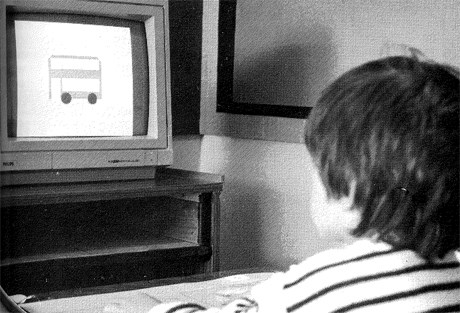
In the end, pragmatism tends to triumph. On baby monitors, in the issue of 20 September 1951, a parent advises, ‘Get one by all means and save endless trips upstairs, and listening above the noise of a wireless.’ Pleasure and learning can be gained from technology by children of all ages and this has long been recognised by Nursery World. A child psychologist in 1974 argued that watching television can ‘widen a child’s horizons’ (9 May 1974); in the 1990s the advantages of software for Acorn, PC and Mac computers for helping children to understand ‘All about me’ was discussed (8 September 1994) while a practitioner this year wrote, ‘Using iPads stimulates children’s interest and engages them immediately, as they instantly see a lesson as a game’ (9 February 2015).
We are now in an era where some types of technology can provide respite from others. ‘In settings all around the country, touchscreens and tablet computers have been found to provide liberation from taking turns at the mouse and keyboard of a typical desktop PC’ (5 May 2014). Children as young as two years old know the words ‘download’, ‘Facebook’ and ‘Google’, which would have been incomprehensible 90 years ago.
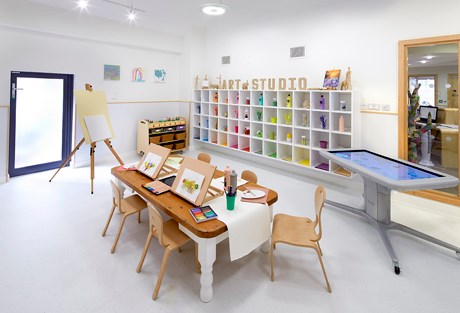
Bright Horizons Clapham Village art room equipment includes a touchscreen SMART Table
NEW INVENTIONS
Baby monitor
‘I have discovered something that will solve many a mother's problem. I was in a room the other day, when without any warning, I heard a baby whimpering, softly, yet very distinctly, close by me. Yet there was no baby in the room! My hostess, seeing my surprise, explained that the baby was at the top of the house – three floors above – but that with this neat contrivance (it was on the mantelpiece) she could hear every murmur of baby just as clearly as if she were standing by the cot.’ (8 April 1936)
‘Mobile’ phones
‘A Post Office mobile coin-box telephone, which can be wheeled to the beds of patients, was installed at the Acton (London) Hospital. It has had such a good effect on the morale of patients, especially children, that similar telephones may be installed in other hospitals.’ (17 February 1955)
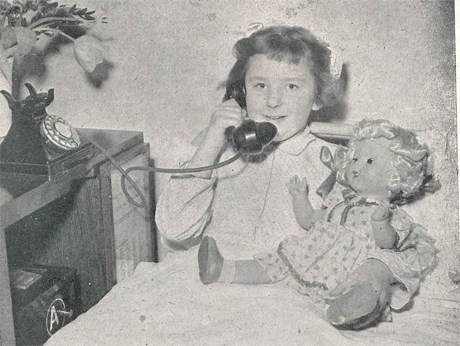
‘Picture without x-rays’
‘A device similar to echo-sounding equipment on ships is being used at the University of Liverpool for examining pregnant women… This simple examination takes about 20 minutes and the patient feels no sensation other than the movement of a simple plastic disc across her abdomen.’ (13 September 1973)
Digital cameras
‘The first advantage of digital cameras is that you can see what your photograph will look like almost instantly thanks to a small viewing screen on the back, so eliminating the wait for films to be processed only to find the children's heads have been chopped off! The cameras themselves do not come cheap but, as the cameras don't use conventional film, there are no film and processing costs, or drop-off and pick-up times.’ (19 July 2000)
Security systems
‘High-tech security systems installed in nursery chains around the country – from video entry phones to finger print recognition – are attempting to make it a “Mission Impossible” for unwanted visitors to gain access.’ (6 June 2001)
